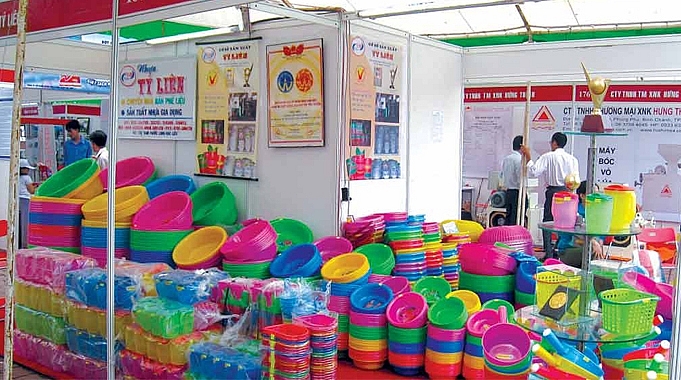Vietnamese plastic sector gradually seized by foreign firms
 |
| Not only for domestic consumption, Vietnamese plastic products are also exported to overseas markets like South Korea, Japan, and China |
A long time after first buying into Binh Minh Plastic JSC (BMP), Nawaplastic Industry Co., Ltd.—a subsidiary of Thailand's SCG—has purchased an additional 185,970 shares in Binh Minh Plastics JSC to raise its ownership to 51.1 per cent. Earlier, Nawaplastic sold its entire holding of 23.84 per cent stake in Tien Phong Plastic JSC to pour into BMP.
SCG expects to invest $6 billion into the Vietnamese plastic sector by 2020, after pouring $121 million into seven Vietnamese plastic companies, such as Viet Thai Platschem, TPC Vina Plastic & Chemical, Chemtech, and Minh Thai Plastic Materials, as well as a number of packaging firms. The sales of the group in Vietnam reached VND25.7 trillion ($1.13 billion) last year.
Not only Thai, but South Korean investors are also watching the Vietnamese plastic market. After acquiring Minh Viet Packaging One Member Co., Ltd., South Korea’s Dongwon Systems Corporation purchased Tan Tien Plastic JSC. This is one of the leading packaging companies in the food sector with VND1.3-1.5 trillion ($57.3-66.1 million) in annual revenue. The clients of Tan Tien Plastic include market-leading brands like Unilever, Ajinomoto, Acecook, Trung Nguyen, and Vinamilk.
Currently, Dongwon Systems Corporation holds 97.83 per cent of Tan Tien Plastic. After the acquisition, all Vietnamese members of the board of management and even founders have been replaced by South Korean entrepreneurs.
Japanese companies are also shaping up to be a force in the market. In Tien Phong Plastic JSC, Japan’s Sekisui Chemical Co., Ltd. has replaced SCG as a key shareholder of this company. Meiwa Pax Group spent $16.5 million to acquire Saigon Packaging JSC (Sapaco), Oji Holding Corporation acquired United Packaging Co., Ltd., and Sagasiki Vietnam acquired Goldsun Packaging and Printing JSC.
| According to Vietnam Plastics Association (VPA), in 2017, the total export turnover of the plastics sector hit over $3 billion, up 17.6 per cent compared to 2016. |
According to economist Dinh The Hien, the massive investment of foreign companies into the Vietnamese plastic industry aims to take advantages of incentives on land, taxes, and material price, as well as energy and cheap labour to save costs. Vietnam’s participation in a series of free trade agreements will also bring multiple benefits to foreign firms.
“They also fully utilise the entirety of their value chains that they have built in Vietnam from input to output, including manufacturing facilities, wide distribution networks, and retail chains,” Hien told plo.vn.
This has put strong pressure on Vietnamese plastic companies, especially as there is a chronic lack of capital and skilled human resources as well as technology.
“Vietnamese firms have to import materials. Expenses for production and business are rather high in this industry, which results in higher selling prices. Thereby, the net profit of these firms will be affected significantly if factors like exchange rate, interest rate or import tax policy change,” said VPA’s chairman Ho Duc Lam.
According to VPA, per capita plastic consumption will rise and reach an annual 45 kilogrammes by 2020, equivalent to a growth of 4 per cent per annum. Plastic companies have imported the highest manufacturing technology to match the standards of Europe, the US, and Japan to facilitate exports. There is a wave of extending manufacturing scale among Vietnamese plastic companies to improve competitiveness, including An Phat Plastic Company and Dong A Plastic.
What the stars mean:
★ Poor ★ ★ Promising ★★★ Good ★★★★ Very good ★★★★★ Exceptional
Related Contents
Latest News
More News
- VinaCapital launches Vietnam's first two strategic-beta ETFs (February 26, 2026 | 09:00)
- PM sets five key tasks to accelerate sci-tech development (February 26, 2026 | 08:00)
- PM outlines new tasks for healthcare sector (February 25, 2026 | 16:00)
- Citi report finds global trade transformed by tariffs and AI (February 25, 2026 | 10:49)
- Vietnam sets ambitious dairy growth targets (February 24, 2026 | 18:00)
- Vietnam, New Zealand seek level-up in ties (February 19, 2026 | 18:06)
- Untapped potential in relations with Indonesia (February 19, 2026 | 17:56)
- German strengths match Vietnamese aspirations (February 19, 2026 | 17:40)
- Vietnam’s pivotal year for advancing sustainability (February 19, 2026 | 08:44)
- Strengthening the core role of industry and trade (February 19, 2026 | 08:35)

 Tag:
Tag:


























 Mobile Version
Mobile Version